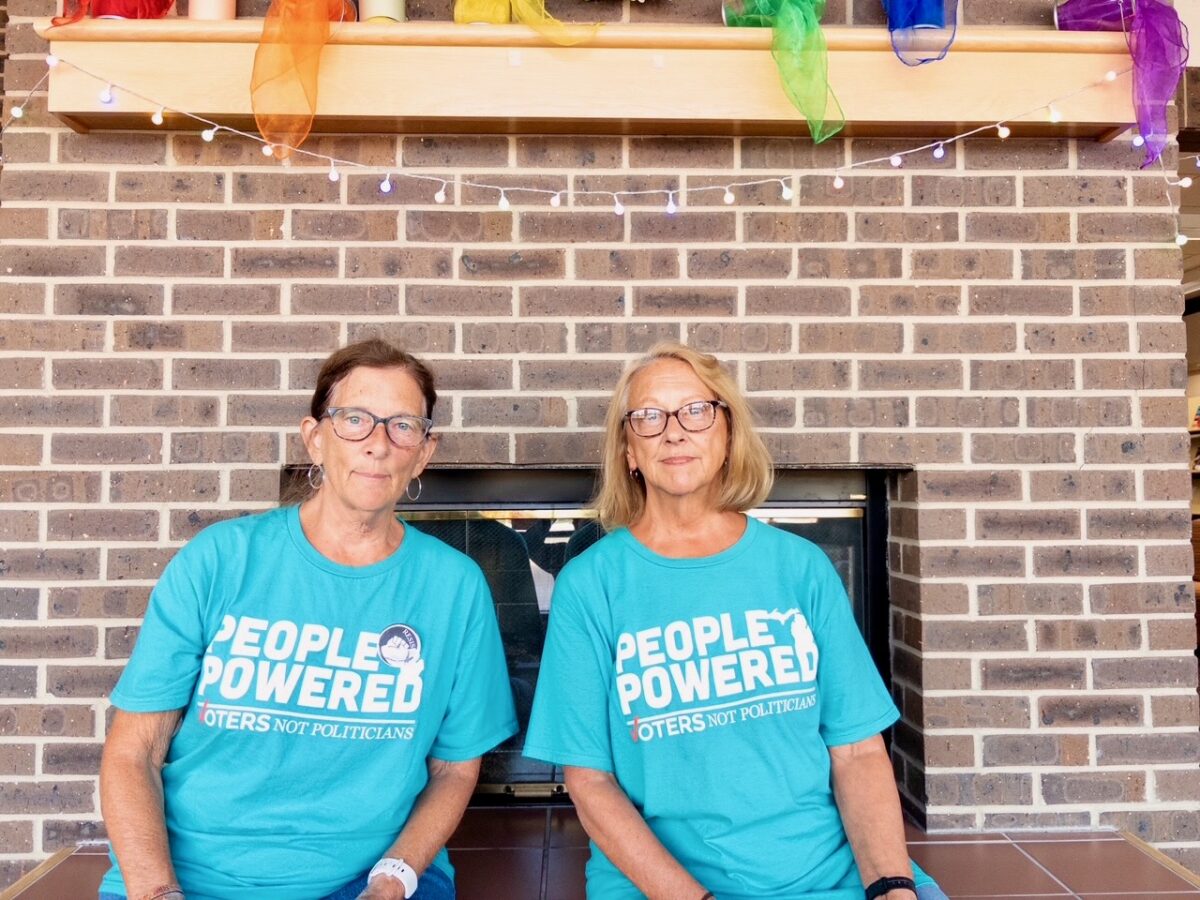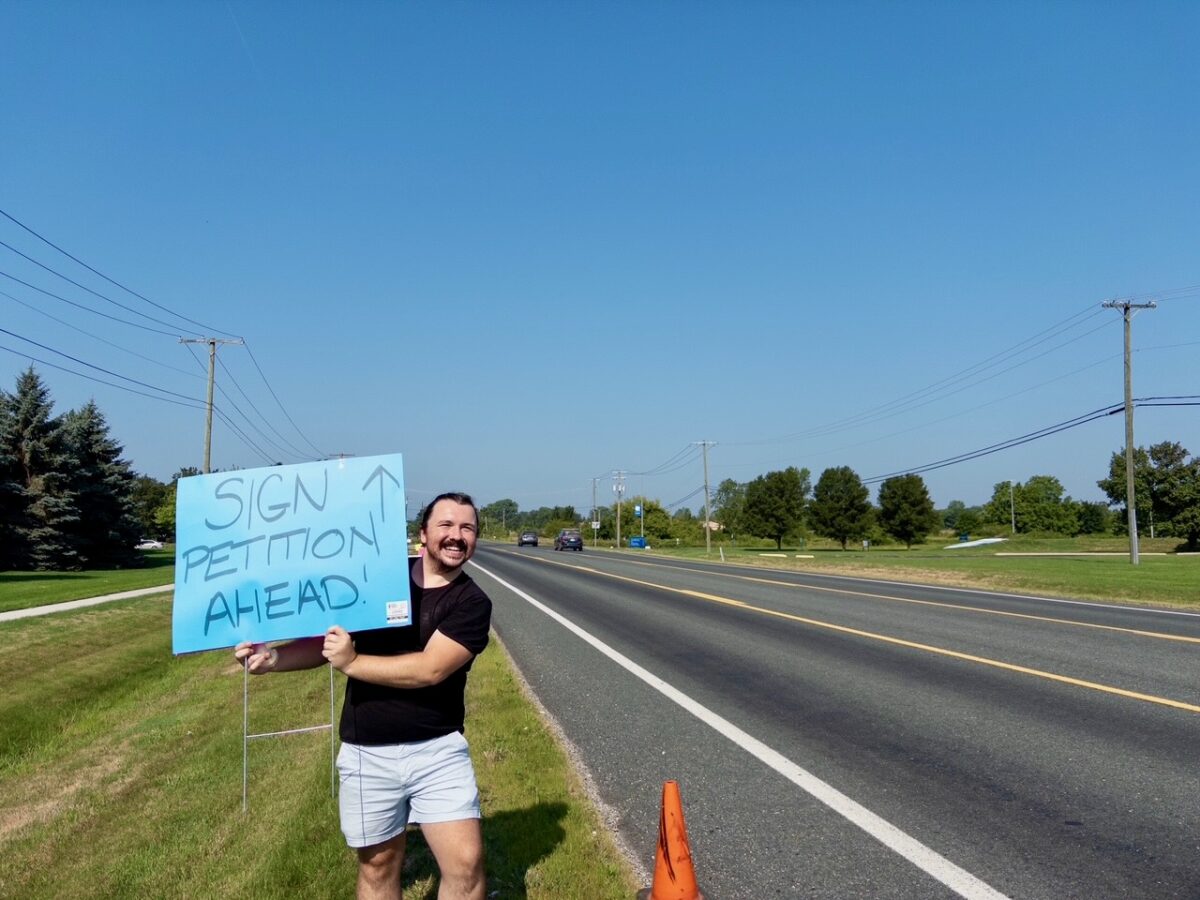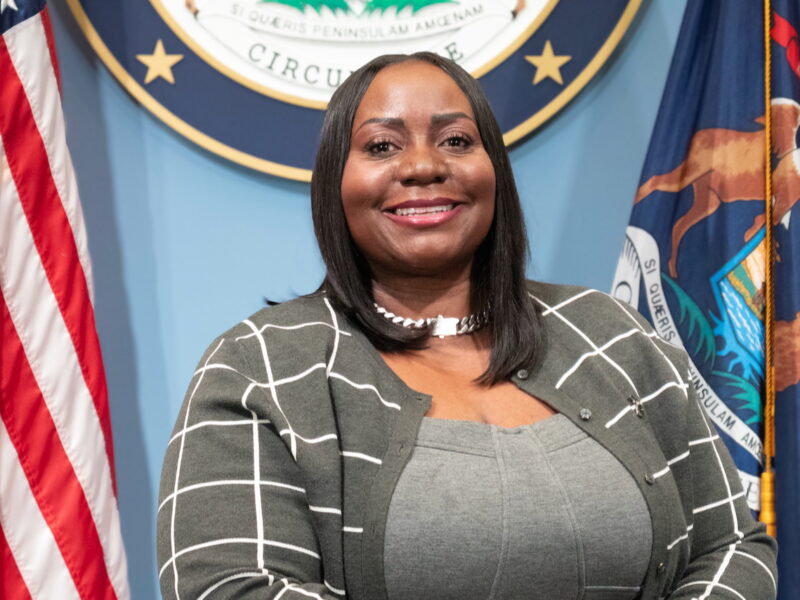Overview:
-A ballot committee will need 356,958 signatures to place an initiative to block Michigan's regulated utilities from political donations on the ballot.
-The Michigan Board of State Canvassers will consider the initiative on Friday.
-DTE, Consumers spokespeople say political spending does not come from ratepayers.
A ballot committee that aims to block DTE Energy, Consumers Energy, and other companies from making political donations is hosting town halls across the state ahead of an Aug. 22 meeting of Michigan’s Board of State Canvassers where its initiative could clear the next hurdle to reach the November 2026 ballot.
Taylor resident Nancy Johnson plans on volunteering with the group Voters Not Politicians to collect signatures for the effort. She told Planet Detroit she has experienced six power outages in the last year, but said utilities like DTE are blocking progress on reliability while rates go up.
“These companies that are giving money to the politicians are the ones whose voices are being heard,” she said. “We want to make sure that that doesn’t continue.”
Johnson and around 10 others met at the Southgate Veterans Memorial Library last week for an information session on the Michiganders for Money out of Politics, or MMOP, ballot initiative, in one of over a dozen town halls being held across the state.
Ballot initiative aims for November 2026
The ballot measure will help address the influence of big money in Michigan politics, according to Christy McGillivray, executive director for Voters Not Politicians, which is helping organize the petition drive.
McGillivray called attention to DTE’s donations to former House Speaker Joe Tate (D-Detroit) following the 2023 ice storm that knocked out power to around 700,000 Michiganders, and the legislature’s subsequent failure to pass legislation to provide ratepayer protections.
Michigan utilities’ influence over the political process may be especially salient for Michigan voters, who deal with frequent power outages and some of the highest electricity rates in the region.
“Instead of investing the ratepayer dollars … in making sure that they prioritize service delivery and keeping utility rates low, they prioritize shareholder payouts, political giving, and CEO salaries,” McGillivray said.
The ballot measure would ban political contribution from regulated monopolies, companies with government contracts over $250,000, or businesses seeking such contracts. It would also add reporting requirements for dark money nonprofits, requiring them to identify donors and spending totals for ads that reference a candidate.
If the 100-word summary of the initiative and the form of the proposed initiative are approved this week, organizers will have 180 days to collect the 356,958 signatures needed to place it on the November 2026 ballot.
MORE PLANET DETROIT REPORTING
Ballot drive kicks off to put Washtenaw County data center decision in hands of voters
Augusta Township residents are gathering signatures to challenge a rezoning decision for a planned $1 billion data center. Concerns over rising utility costs, environmental impact, and grid strain drive their efforts.
DTE Energy lawyer: Utility not liable for Zug Island facility in Clean Air Act lawsuit
The EPA’s position of holding the parent company liable would “destroy” the point of corporations, and “pierce the corporate veil,” an attorney for DTE Energy and EES Coke Battery says in federal court.
Michigan utility commissioner appointment sparks environmental justice concerns
Whitmer praises new MPSC appointee Shaquila Myers’ work on clean energy legislation, but ratepayer advocates say they fear utilities influenced governor’s decision.
DTE, Consumers say customers don’t pay for political spending
DTE spokesperson Jill Wilmot said disclosures for corporate donations and political contributions show “DTE’s commitment to our customers and communities we serve, helping us meet our aspiration of being best in the world and best for the world.”
Consumers spokesperson Brian Wheeler said: “We participate in the legislative and political processes with a focus on compliance and transparency, and no customer funds are used for any political contributions.” The utility’s costs of service, which form the basis for its customer rates, do not include political contributions, he said.
Representatives for both companies said that political contributions don’t come from ratepayers, with Wilmot saying DTE employees or shareholders make these contributions.
Amy Bandyk, executive director of the Citizens Utility Board of Michigan, has previously challenged this reasoning, saying “the revenue all comes from ratepayers.”
Political spending increases, and so does bipartisan opposition
Money’s influence over Michigan politics is growing significantly, McGillivray said last week. A Bridge Magazine report found 2024 was the most expensive election in state history, with at least $67 million spent on Michigan House races.
Yet there’s bipartisan support for getting money out of politics.
State Rep. James DeSana (R-Carleton) and Democratic Socialist Rep. Dylan Wegela (D-Garden City) are among the sponsors of a “take back our power” bill package reintroduced in April to bar political spending by utilities and other monopolies doing business with the state.
A poll found 90% of Democrats, 84% of Independents, and 66% of Republicans supported a 2024 version of the “take back our power” legislation after hearing a description of what the bills would do.
McGillivray told Planet Detroit she expects the MMOP organizers to be outspent 10 to 1.
The Michigan Chamber is pushing back on the proposal, calling it an impingement on free speech in a July press release.
“This egregious proposal appears to silence the voices of job providers and limit free speech for some while giving others, like labor unions, a free pass,” the press release said.
McGillivray told the Southgate group that corporate spending is the actual censorship.
“When you are turning on the money spigot … you are drowning out the voices of every other Michigander that sent people to Lansing,” she said.
Ponsella Hardaway, executive director for the nonprofit MOSES – Metropolitan Organizing Strategy Enabling Strength – told the Southgate meeting it’s important to talk with friends and families about the ballot initiative because corporate interests will try to confuse voters.
“We are stronger in numbers with people, but we got to talk to each other,” she said.
Voters Not Politicians has a track record of doing this kind of education and outreach.
In 2018, the group ran a successful ballot initiative to replace partisan gerrymandering with an independent redistricting commission. The group said it collected 425,000 petition signatures for the Constitutional amendment, which received 61% of the vote.
Johnson, the Taylor volunteer, said residents were receptive to MMOP’s message.
“Any time that we mentioned getting money out of politics, people are just, ‘oh, sign me up.'”





